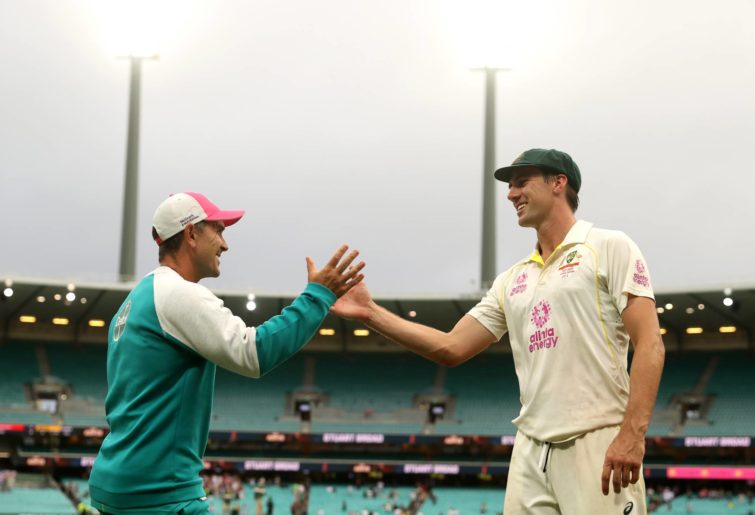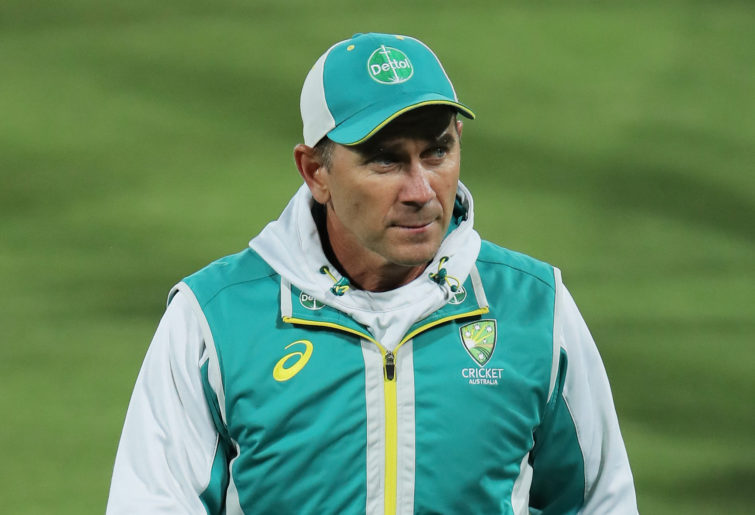That nebulous rabble that is the Australian media had a lovely time this summer. An underwhelming England squad gave them plenty of stories both on and off the field, as did Justin Langer.
Even after Australia had taken the last wicket in Hobart the media were suggesting his position was untenable, mostly because the players, including the skipper, apparently didn’t make the appropriate comments of peace, love and support.
It mattered not that Langer’s contract still has a few months to go, that there have been no negative comments about him in recent months and that he and the other coaching staff helped Australian teams win significant tournaments within three months of each other.
At some point Langer must have asked himself if the job is worth it. I’m guessing Nick Hockley and others at Cricket Australia would have been asking themselves similar questions given how his tenure has played out over the past 12 or 14 months.
The question no-one seems to have asked is: do we really need an Australian Test cricket coach?

(Photo by Mark Kolbe/Getty Images)
Cricket at the top level seemed to survive just fine without a coach from the time of the first Test in 1877 until Bob Simpson was appointed to the role in 1986.
Teams in the first century of Test cricket had managers, especially when touring overseas, and had whatever help they needed from members of the Australian cricket boards. Any assistance they needed with their technique came from state or other coaches and from each other.
Fast-forward to Simpson’s appointment and Australian cricket in flux.
Allan Border was the only truly top-class Test performer, but he was also a reluctant captain. It made a lot of sense to bring in someone who understood the game as well as Simpson did, who could actually coach guys and teach them all manner of things about preparation for games, tactics and so on but could also help Border with the increasingly onerous media responsibilities.
I was and still am a huge fan of Simpson, but even I have to admit he probably stayed on the scene at least a couple of seasons too long.
Allan Border was very much his own leader well before he retired, and his successor, Mark Taylor, probably chafed a bit under Simpson once he became comfortable in the captain role, which didn’t take long.
This was also a time when Australia was blessed with a lot of extremely talented players, so it begged the question: what exactly was Simpson’s role?
In the post-Simpson era, we’ve had another six coaches: Geoff Marsh, John Buchanan, Tim Nielsen, Mickey Arthur, Darren Lehmann and Justin Langer.
I believe the role of any cricket coach is to mentally and physically prepare a player and team to play a game of cricket. If this is accepted as a valid definition, I’d suggest we’ve had little need for at least three of these coaches and the other three have garnered more negative press and team division than the players they’re supposedly helping.
Bear in mind that part of the coach’s role also falls on the shoulders of the captain. In the century before Bobby Simpson’s appointment much of the player support and particularly the man management fell on the shoulders of the captain.
I find it very difficult to see captains like Monty Noble, Bill Woodfull, Don Bradman or Ian Chappell wanting, needing or putting up with a coach.
There’s clearly a need for actual coaches – that is, people who will assist the players at practice. At Test level, though, many players have their own go-to coaches or advisors. Trent Woodhill, for example, is clearly a go-to guy for Dave Warner, so while Andrew McDonald and the other coaches that make up the extended Australian support staff can offer advice, it’s likely most players would rely on other coaches for technical support.
There’s also a need for people to make arrangements for practice to make sure guys get the practice they require, but these are support staff, not the main act the head coaching role appears to have become.
I can certainly see a need for someone to provide support for captains, but does that person necessarily need to be a coach?
Michael Clarke was an outstanding batsman and a great tactical captain but a poor people manager. He needed a person who would help him manage the players. Instead he had Mickey Arthur for some of his captaincy, and most know how that turned out, especially in India in 2013. And his replacement, ‘Boof’ Lehmann, was not a lot better.

(Photo by Matt King – CA/Cricket Australia via Getty Images)
Another premise that needs to be mentioned is that cricket at the elite level is supposedly 90 per cent mental.
Mental preparation is far more important than physical execution. It makes no difference how good they’re seeing the ball or how well they’re bowling; if players are not mentally ready to do their jobs, they’re not likely to succeed.
On that basis players need someone to make sure they’re ready to play, but again, does that need to be a cricket coach? Does it even need to be a cricket player?
How much motivation did those players need in that period when Mark Taylor, Steve Waugh and Ricky Ponting captained? How much motivation could those three individuals provide without the help of a coach?
It was a brilliant move to bring in Justin Langer at the time Cricket Australia did. Elite men’s cricket in Australia was in a very bad place in 2018, and Langer’s personal qualities, not his ability to coach, were exactly what was needed to set the team back onto the right track.
Fast-forward to the present and it seems clear to me Langer is no longer required. Other than the media beating him up over the summer, he’s been perfectly happy to take a back seat and allow Pat Cummins to lead the team on and off the field. That only came about because the players voiced concerns about his approach, especially his intensity.
Should Langer be allowed to stay? If Cricket Australia thinks it needs a coach, then yes, he should stay, as long as he remains a support act, not the main event. Whatever support he’s now doing is working, as recent results in the T20 World Cup and the Ashes would indicate.
If Langer were to go, should he be replaced? I’d like to see Cricket Australia get brave and not have a head coach. They could create a role titled ‘director of coaching operations’ to oversee the support staff, but right now I don’t think Australian cricket needs a coach.
Pat Cummins has shown through his mature approach to the captaincy in the Ashes that he’s ready to lead the Test team. He’s got a wealth of experience to call on just within the team, and of course he can call on anyone he likes outside the team if he thinks they can provide the right support.
We also have a vastly experienced white-ball squad, with Aaron Finch providing similar calm, mature leadership to these players. He too can call on anyone he likes for support, so, once again, a head coach is not required.
In the past few decades communication methods have reached the point where just about anyone anywhere in the world can be contacted by phone or video link at any time. Why are we not taking advantage of this from a coaching perspective?
Cricket at the elite level is played by the best 11 players, but coaching is an activity at can be done by any number of people. Employing a person as head coach automatically places limitations on how the team goes about preparing.
This limitation will become critical when we tour Pakistan, Sri Lanka and India over the coming months. I don’t think there’s any way a man named Langer or Trevor Bayliss or Jason Gillespie can prepare for these trips. This is where Cricket Australia has to get creative and contact people in each country who can help guide the team or even individuals within the team.
I think Australian cricket would not only survive but thrive without a head coach. This position, which started off as a means of providing support to a beleaguered captain, has morphed into a role that all too often provides unwanted headlines, serious distractions and a lot of additional work for CA.
If it remains, it needs to become a secondary player and a distant second to the captain and the team. If that can’t happen, remove the role and only reprise it when the need arises, which is not the case at present.































































































